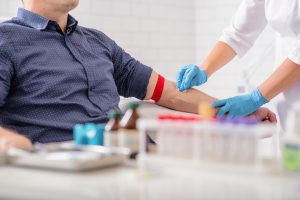Convalescent plasma, blood plasma from individuals who have recovered from a COVID-19 infection, has emerged in the past year as something almost akin to liquid gold, and has been studied as a possible treatment for patients suffering from the illness caused by the virus SARS-CoV2.
However, convalescent plasma requires a donor, a new player in the world of clinical trials.
Researchers from the Lawrence Bloomberg Faculty of Nursing, and the Canadian Blood Services Organization are partnering to conduct a new study examining the role of blood donors in clinical trials, their motivations, and the impact of the pandemic.
“We want to know more about the donor and what motivates them to participate, because they are an important stakeholder in this process, and their rights, risks, and benefits, need to be explored,” says Quinn Grundy, a lead investigator on the study, and an assistant professor at the Lawrence Bloomberg Faculty of Nursing.
Grundy has previously studied the ethics around conducting clinical trials and the role of the pharmaceutical industry. She says that there is a growing body of evidence that clinical trials conducted and sponsored by pharmaceutical companies can lead to sponsorship bias and safety risks for those involved.
“Globally, the majority of clinical trials to treat disease are conducted or sponsored by the pharmaceutical industry and as a result such studies are more likely to yield positive results for the drug company,” says Grundy.
The Canadian Blood Services Organization (CBS), as a publicly funded entity offers a different and interesting case study for a clinical trial. In the case of convalescent plasma, trialists have had to instead rely on donors to provide the ‘drug’ and there is no clear commercial incentive, if proven effective. Kelly Holloway, co-PI on the study and a scientist at CBS says that this is an important opportunity to pay attention to any implications around governance and research integrity by understanding the role of publicly funded blood collection agencies in clinical trials.
“We want to learn from these various engagements with donors and learn from the challenges given that this trial was conducted during a global pandemic,” says Holloway.
The study will survey people who volunteered to donate convalescent plasma, to understand how they were communicated with and their motivations for donating. The study will also look to understand the role of CBS as a blood operator in recruiting donors and comparing donor recruitment activities across major trials that took place around world from countries like India, the UK, China and the US.
With funding received from the MITACS Accelerator fellowship, two graduate students from the Lawrence Bloomberg Faculty of Nursing, Ridwaanah Ali and Chantal Campbell, have served as research assistants on the study, part of the CBS’ goal to build capacity and social science training in nursing students.
They are also perusing the several hundred documents that exist around various global trials from social media posts and blogs that tell stories about donors being chauffeured in Uber’s in Argentina, or NBA players and The Rock launching donation campaigns on Twitter.
“This is such a unique opportunity for us to explore other aspects of nursing in research related work,” says Ali. “Our work on this study is helping to inform future donor recruitment.”
Campbell agrees, “It has been interesting to do research in partnership with CBS. We are seeing or research skills put to work to create tangible outputs.”
While the CBS clinical trial is no longer recruiting participants, because it has been determined that there is no significant benefit seen at the moment for convalescent plasma as a treatment, this study is helping to inform future studies, and the use of plasma donation for other important medical needs.
“What’s come out of this more than anything is the importance of building relationships and building trust,” says Grundy. “We see some hope for transparency within clinical research in this study, and that’s a positive thing for science.”
